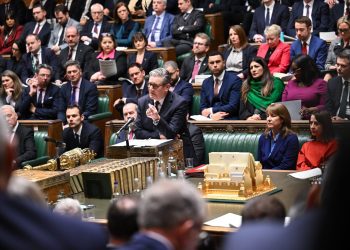Consider the context in which Labour’s fleeting political honeymoon came to an end last year. The parliamentary rebellions, the petty scandals, the inability to expound a compelling narrative, the contradictory messaging, the churn of noisy media controversy, the incessant hum of vituperative internal briefings — the unforced errors.
Labour’s malfunctions exacted a heavy toll, as its polling declined gradually but inexorably during the July-December period. The populists were the prime beneficiaries of this dysfunction. Establishment drift found an unforgiving contrast in Reform UK’s insurgent right politics. Meanwhile, Labour’s grim economic narrative — a political response to its historically harrowing inheritance — misinterpreted the moment. The government’s already precarious electoral foundations rattled as restive voters collectively tuned out.
Drastic action followed. Sue Gray was ennobled out of No 10. Morgan McSweeney, Downing Street chief of staff in Gray’s stead, soon succeeded in establishing a sharper strategic definition. But it was Donald Trump, returned to the White House as president in January, whose sudden prominence vitalised Labour and afflicted Keir Starmer with purpose.
Outwardly, it was these new realities that framed the chancellor’s remarks on Wednesday, as she appeared before MPs to deliver her highly anticipated spring statement. “The world is changing — we can see it and we can feel it”, Rachel Reeves insisted at the outset. She did not mention Trump by name, but his presence cast a long shadow over proceedings.
***This content first appeared in Politics.co.uk’s Week-in-Review newsletter, sign up for free and never miss this article.***
There was however, a palpable dissonance between the rhetoric of the spring statement and its substance. Reeves’ ostensible focus was on a world in flux, but this (minor) fiscal event derived its meaning from factors that have remained constant — those measures said to stand on their own merit, detached from developing geopolitical forces.
The first and most domineering of the chancellor’s fiscal rules states that the current budget must be in surplus in 2029/30. Speaking on Wednesday, Reeves announced that the Office for Budget Responsibility (OBR), the economic watchdog Labour has lionised in recent years, had ruled that the fiscal position established by the autumn budget would have rendered the budget in deficit by £4.1 billion by 2029/30 — around £14 billion less than the £9.9 billion surplus in the October 2024 forecast.
The chancellor’s spring statement undertook to offset these forecast changes. Reeves filled this £4 billion “black hole” and restored the budgetary position to leave precisely £9.9 billion of fiscal headroom — to the decimal point. A remarkable feat of fiscal reengineering if nothing else. Her main interventions were £4.8 billion of welfare spending reductions, £3.6 billion of departmental day-to-day spending reductions, and £1 billion of additional revenue from reducing tax avoidance.
The welfare spending reductions, the largest portion of this fiscal consolidation exercise, was arrived at after a back-and-forth between two sets of economists at the Treasury and OBR. The OBR’s modelling rejected the Treasury’s initial assumption that the reforms would yield £5 billion for the exchequer. The independent body decreed that the changes were worth £3.4 billion and marched Reeves back to the drawing board. After a last-minute scramble in the Treasury, further cuts were found and the quango in question was duly placated.
Politically, the saga served rather to undermine the argument — articulated across government in recent weeks — that welfare reform represents a “moral” pro-work crusade, as opposed to a Treasury bean-counting exercise. Work and pensions secretary Liz Kendall, perhaps cognisant of this fact, could hardly have sat further from the chancellor along the government frontbench on Wednesday.
Long Truss
Trump, of course, was not the only populist whose influence shaped Reeves’ speech.
The spectre of Liz Truss haunted every phase of the spring statement process. Its substance had been aggressively publicised in advance — either officially at the despatch box or anonymously to lobby journalists — for fear of provoking a market reaction. The government’s self-imposed rules serve as a signal of its fiscal rectitude. Politically, they reflect a claim to the mantle of economic competency that the Conservatives under Truss renounced.
The prominence of the OBR serves a similar purpose: Labour hugs it close because Truss shunned it.
But this approach has attracted criticism in recent weeks from an array of Labour sources. Anneliese Dodds, the former international development minister, wrote in her resignation letter that she “expected we would collectively discuss our fiscal rules”. In a piece for Politics.co.uk last week, Jonathan Hinder, a member of the Blue Labour caucus of MPs, questioned the logic of having fiscal events “entirely framed” by the OBR. And Labour grandee Lord Blunkett, a cabinet minister during the Blair years, warned in an article for the Conversation this week that Reeves’ fiscal rules have become self-denying and self-defeating.
The intervening former home secretary argued that the government has bound itself to “a moment in time” when the memory of Truss’ tenure still loomed disproportionally large and markets remained aquiver. Reeves’ positioning, Blunkett suggests, is contentedly hostage to an old political era defined by outdated imperatives. This rare outbreak of “soft left”, Blue Labour and Blairite harmony would suggest a political conversation about the OBR is materialising.
Fiscal statements are, by their very nature, statements of intent. Chancellors appear before MPs to update the country on the economic course and reveal the government’s roadmap to navigate it. And while the spring statement marked a corrective intervention from the chancellor — literally restoring lost headroom, it served too as a profound signal that the government will not be moved on fiscal rectitude.
In other words: Reeves, the iron chancellor, has doubled down on her steely reputation.
Labour MPs are understandably nervous. This is the vein of thinking, after all, that delivered the winter fuel payment cut in July and began the government’s political doom spiral into unpopularity. The statement points to a familiar and unresolved strategic tension that risks casting the government back to its days of drift and dysfunction.
The chancellor is boxed in, in a fiscal sense, by Labour’s tax pledges and her iron oaths. But she is also boxed in politically by the reputation she crafted in the weeks, months and years that followed the mini-budget in September 2022 — when she came to symbolise fiscal conscientiousness and Labour’s renewed commitment to economic orthodoxy. Electorally, there is good reason to believe Reeves was a win for Labour on the doorstep last July — as a living, breathing negation of the party’s historic brand vulnerabilities.
Today, Reeves’ reverence for economic orthodoxy and its guardians in the OBR appears somewhat out of step with the momentum of events — as Labour has turned on bureaucracy and embraced a blue-tinged “insurgent” government. There is, at the very least, a rhetorical tension between the government’s insistence on “stability”, shaped by the political imperatives in a post-Truss world, and its disruptive footing of recent weeks.
Plainly, Labour needs a more compelling narrative than that of fiscal probity. Shovelling money into black holes is not an act, however economically prudent, with any political meaning. With the government emphasising the need to “step up” to world events, ministerial exchanges with the OBR risk coming off irrelevant at best and self-indulgent at worst.
***This content first appeared in Politics.co.uk’s Week-in-Review newsletter, sign up for free and never miss this article.***
The spring statement was both a political and economic holding exercise, as Labour reckons with the immediate consequences of Donald Trump’s presidency in lieu of a more far-reaching reset. But the government’s position remains exposed on both fronts — to the whims of the White House and the headwinds Trump generates. A Bloomberg piece published Thursday, not 24 hours after the spring statement, reported that the chancellor had already lost half of her £9.9 billion buffer — about the same figure that was saved on account of the government’s welfare reforms. The chancellor’s fiscal headroom, still the third-smallest on record, remains fragile. The OBR says the probability of this target being met is 54 per cent.
This points to another round of painstaking speculation as attention turns to the spending review in the summer and then the autumn budget.
Reeves’ room for manoeuvre has never been more limited. The chancellor looks to have exhausted the Labour Party’s already limited appetite for spending cuts; months of cabinet rows could be on the cards between the chancellor and secretaries of state of unprotected departments. SWI’s consideration of possible tax rises will be similarly fraught. Reeves probably pursued the most politically acceptable hikes at the autumn budget. But the chancellor will know she cannot go back to businesses for more. That will bring Labour into conflict with its manifesto tax pledges on income tax, VAT and (employee) national insurance.
In sum, a sclerotic, inscrutable combination of fiscal rules, spreadsheets, tax pledges and economic projections are carving the course for this government. A restoration of political drift, and its dire multiplier effects, seems almost certain at this juncture. Nor do the figures provided by the (historically optimistic) OBR suggest growth is about to bail Reeves and the government out.
***This content first appeared in Politics.co.uk’s Week-in-Review newsletter, sign up for free and never miss this article.***
The pre-autumn budget proxy war, which did such damage to the government last year, has already begun — months ahead of schedule. Every morning media round since the spring statement has secured a pointed non-denial about tax rises. Prepare for months of debilitating scene-setting, pitch-rolling and expectation management: the antithesis of “insurgent government”.
A picture of this parliament emerges, in which the government careers between a sequence of corrective mini-budgets. The straightforward political untenability of this scenario speaks for itself. Nor will perpetual do-overs prove conducive to the economic stability the government stresses is a prerequisite for growth.
In the vein of the government’s travails from July-December 2024 then, the danger for Labour is not immediate crisis — but the slow erosion of its arguments and standing.
That is before one considers the possibility that the cuts, announced in the autumn budget, will resonate in their own right. Reeves cannot defer blame to the OBR if an “austerity” criticism bites. The “balancing the books on the back of the poorest” line does, on the face of it, sound like the sort of phrase that could stick among certain groups of voters — particularly those progressives for whom electoral outlets are provided by the Green and Liberal Democrat parties. Indeed, this sentiment was represented on the front pages of both the Guardian and Daily Mirror this week.
Time is on Starmer’s side, if nothing else. But the next six months look set to be politically agonising for the government. And sometime, somehow — in the maelstrom of White House pronouncements and corrective fiscal events — Labour will need to make good on its foundational promise: that of “change”.
Josh Self is Editor of Politics.co.uk, follow him on Bluesky here.
Politics.co.uk is the UK’s leading digital-only political website. Subscribe to our daily newsletter for all the latest news and analysis.
The post Week-in-Review: Spring statement looks set to restore sense of drift appeared first on Politics.co.uk.

































